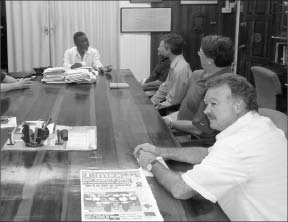Sandspring Resources (SSP-V) envisions annual production from its Toroparu project in Guyana of 310,000 oz. gold and 29 million lbs. copper in the first four years of operations, provided it can first raise the US$617 million needed for mine construction.
The company released a long-awaited preliminary economic assessment for its flagship project outlining plans for a 13-year open-pit mine using a 33,000-tonne-per-day mill. Years five to 13 would see annual production of 273,000 oz. gold and 20 million lbs. copper at an average cash cost of US$424 per gold oz. (net of copper byproduct credits), with lower cash costs of US$317 per gold oz. during the first four years.
By using an elevated gold-equivalent cutoff grade of 0.5 gram per tonne over the mine life, Sandspring says it can improve early cash flows while simultaneously creating a low-grade stockpile it can reprocess in years 14 to 17.
Because gold-copper mineralization at Toroparu is spread throughout both saprolite (7%) and primary bedrock (93%), the company will have to employ two separate processing circuits (3,000 tonnes per day for saprolite and 30,000 tonnes per day for fresh rock), raising preproduction costs.
The bedrock appears to be shear zone related with some indications of porphyry, hosted within a volcanic sequence and sulphide mineralization.
“We’ve designed something that Sandspring can handle,” president Abraham Drost explains in a telephone interview from the company’s office in Thunder Bay, Ont.
“We recognize that there is still significant blue sky within the deposit as it is currently outlined – for example, there is significant potential at depth that we really haven’t touched yet.”
Of the US$617 million estimated for construction costs: US$245 million is allocated toward building the processing plant; US$110 million is for off-site infrastructure; US$105 million is for mine equipment; US$85 million is for a heavy-fuel-oil electric power plant and transmission lines; and US$26 million is for tailings facilities and on-site infrastructure such as camp accommodations.
“There is potential as we go through feasibility to look at different trade-off options with respect to larger capacity,” Drost notes. “But at this point, we wanted to keep it simple.”
Before any building begins, Sandspring will first have to spend roughly US$44 million completing a feasibility study and permitting. Fortunately, the company already has about US$40 million in working capital and securities as at Feb. 28, 2011, and is debt free.
This year the company plans to start the feasibility study, carry out more definition and exploration drilling, complete further metallurgical testing, and advance other exploration target areas through geophysical surveys and sampling.
Sandspring has also released an updated resource estimate for Toroparu which showed a 32% increase in measured and indicated resources and a 40% increase in inferred resources. The projects now hosts 151.9 million measured and indicated tonnes grading 0.72 gram gold and 0.1% copper, containing 3.51 million oz. gold and 330 million lbs. copper. Inferred resources total 214.8 million tonnes of 0.71 gram gold and 0.05%
copper, containing 4.93 million oz. gold and 236 million lbs. copper.
When asked if the company foresees much risk associated with developing a mine in Guyana, Drost explains, “All Guyana’s production is currently from alluvials, however the government has taken a policy direction to move toward large-scale mining, which is more environmentally sustainable over time. Our project fits into that policy direction.
“Guyana is very well-organized, they have a well-established mining act and a mining-friendly culture. (Guyana’s government) sees this project as being one of the prominent near-term gold producers… and we believe at the end of the day there is political will to see this through.”
Sandspring acquired Toroparu in 2009 from a company largely controlled by its chairman, Colorado businessman and ranchman John Adams. He made his reputation in the 1980s and ’90s running his family’s resource company, Energy Fuels Corp., which before it was bought out owned the largest uranium and coal mines in the United States. Since then, the former 40% owner of the Denver Broncos football team has diversified into real estate development, banking, cattle production and gold mining, among other things.
Adams bought his interest in Toroparu around 10 years ago from prominent Guyanese businessman Alfro Alphonso, who runs one of the country’s biggest private alluvial gold mining companies. Like his American counterpart, Alphonso is involved in many other businesses besides mining, including coconut farming, oil mills, gas stations, fish processing plants, television stations and hotels.
The pair mined alluvial gold and saprolite from Toroparu for a few years using a simple 3,000-tonne-per-day mill, but after discovering underlying primary bedrock gold-copper mineralization in 2007, decided to take the business public to fully develop the deposit.
Sandspring issued 38.1 million shares to acquire the property, with chairman Adams now controlling some 28 million shares through his family holding company Crescent Global Gold and Alphonso controlling 7.6 million through Mercedario Ltd.


Be the first to comment on "Sandspring’s high hopes for Toroparu in Guyana"